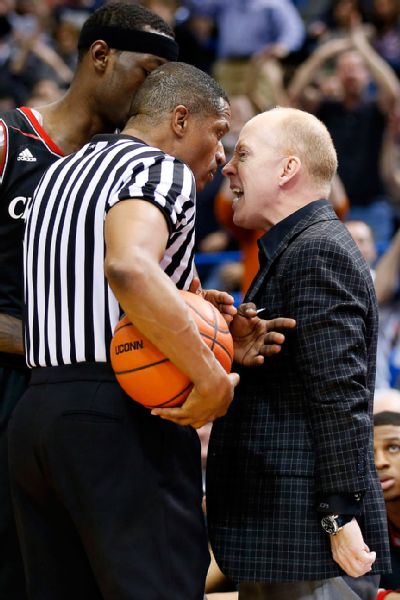 |
| (Image Source: ESPN) |
Anatomy of an Arguement
The former Prime Minister of the United Kingdom, Margaret Thatcher once said in an interview in 1980, "I love argument, I love debate. I don't expect anyone to just sit there and agree with me , that's not their job."
While we all know someone who starts arguments just for the sake of starting an argument, I believe that to a certain degree, all of us "love argument" and "love debate". Maybe it's because we are able to voice our opinion or prove our point. Maybe it's because we just want to win.
As basketball referees, there's nothing that gets the blood going more than the anticipation of having a heated debate with a coach over a call (or calls). As imperfect creatures, when met with fire or hostility, more likely than not, our first instinct will be to push and fight back.
How Not to Argue
But what should we do in a profession where we are asked to remain above the fray? When more often than not, it's not what an we do as an official that gets us in trouble, but rather what we say.
Referee.com has a great article regarding how not to argue. Psychologist and author Peter Sacco lists seven (7) great points to keep in mind when managing an argument. You can read the article here. The link is also posted below:
http://www.referee.com/how-to-not-argue/
Conclusion
As officials, we need to work hard to remain above the fray. While coaches deserve a legitimate answer if they have a legitimate question, do not allow them to use this time to question your game management or calls you've made in the game. Defuse potential problems quickly and move on and never go looking for trouble. However, do not let this be the reason that you allow a coach to be out of control - do not be a rug for them to walk on in your attempt to avoid conflict.
Lastly, always remember that in our interaction with players and coaches in this day in age, there is always the chance that we will be video taped. Eye-witness statements can even be wrong when fans and spectators attempt to "interpret" our body language and actions. Let's carry ourselves as officials in an manner that is professional and becoming of the uniform that we wear.
Example
Last season , there was an unfortunate situation with a coach that got out of control. Our officials on that game handled the situation with composure and professionalism. The week after, I received the following praise from one of the parents who witnessed the whole incident.
"During the game, the [coach] got very agitated and started yelling at the [referee] to make a certain call. He berated [this official] while [the official] tried to ignore him. Finally, [the official asked], “Coach, I have to ask you to calm down and step back.” He continued to yell and now began to follow [the official] around the court.
This whole time, the [officials] maintained [their] cool. [They] never raised [their] voice or looked frazzled. [They] did not try to intimidate the coach. [They] did not assert [their] authority in any way. I was amazed at [their] composure. They did not gang up on the coach or even appear to be stressed themselves."
While I personally believe that this coach deserved the Technical after he started yelling at the officials, the composure of the officials on the court during this heated exchange is commendable. Had the officials reacted differently, the outcome (and the e-mail that I received) could have been very different.
As the Referee.com article says: "It takes a minimum of two people to have an argument. If one person chooses not to participate, that leaves the second party blustering in the wind."
No comments:
Post a Comment